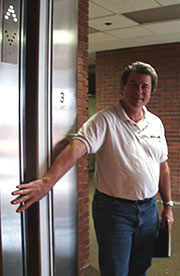How Polite Are You?

How polite are you?
I’d like to advance an idea for a concept and coin a term – “Politeness Quotient” or PQ.
This would represent a range from 1 to 100 where 1 represents the most grumpy, miserable, abusive, antisocial, rude, Scrooge-like misanthrope you can imagine, to 100 which represents a saintly person who bends over backwards and is almost painfully polite and considerate - even past the point where they make you feel guilty for not being as polite. These people are SO polite that they even thought of that so they find ways to help you without offending your own vision of how polite YOU are to them.
Sometimes, it’s hard to know what the right polite thing is to do. How many times have you been walking to a door, and the person ahead of you goes through, then stops and holds the door open for you, but you are so far behind, that you now feel you have to break into a run to save them from having to hold the door any longer than absolutely necessary? So was that person being polite in holding the door? Or was it inconsiderate of them to force you into the position to have to run? And for your part, do you hike up whatever you are carrying and run for it, or wave them ahead and say, “Don’t worry about it – you go on. Thanks anyway.” Or is that throwing their offering in their face? Is that a dismissive gesture showing you don’t care about their offer? Is that a judgment on their inability to judge distance?
Consider the workplace. Have you ever noticed that there is a descending scale of greeting with a person you see in the same office multiple times per day? When you first see him in the morning, you might wave, give a toothy smile and say something like, “Hey Alan! How are you? Are you having a good day?” But then, you pass him in the hall again just an hour later, so you can’t say that again. Instead you just say, “Hey Alan…” and smile and nod. An hour later you pass him again, and now it’s just, “hey” and a smile and nod. Again, an hour later and it’s just a smile and nod. An hour later and it’s a quick nod. The next time after that it's just a raise of the eyebrows.....
If you pass each other any more than that you ignore them as background foot traffic!
The only one who is ever repeatedly excited to see you every time they see you coming is your dog. I’m thinking dogs must have a short-term memory deficit. But for everyone else, there is the Declining Scale of Greeting Energy, or DSGE.
Or how about thanking someone? This can be kind of tricky. Especially in a party scenario where multiple people are present, and multiple people have brought presents.
If you thank a person a little less than they expected, they feel slighted because they think you didn’t appreciate what they did. If you thank them a little TOO much, they again feel slighted because now they wonder if you are being sarcastic and going over-the-top in order to make a point. So learning to thank a person in the right way and to the right degree can be a bit tricky.
If two people bring you a gift, and one person brings a small modest gift, and the other person brings a huge elaborate gift, do you thank them both exactly equally? Or do you thank them appropriately depending on the gift? After all, if you thank the person who gave you the plasma screen TV the same as the person who gave you the re-gifted olive-green 2-slice toaster from Wal-Mart, is it an implied insult to the one who spent $1,000? (No one has ever given me a gift that expensive, so I personally haven’t had that extreme a case, I only use it here as an example to illustrate the point.) Is it simply rude to acknowledge one gift more than the other regardless of the value – or is it more rude to NOT acknowledge the extra effort and expense of the premium gift-giver? Also, what if someone leaves a gift at your door, or sends it in the mail? If you are busy when you receive it, and it takes a couple of days before you respond with a thank you, what exactly is the grace-period with something like that?
How do you handle a person who Over-Gifts? In other words, a person you exchange gifts with who gives you something that is clearly many times more expensive or more thoughtful than the one you gave them? Or how do you handle the opposite case where your gift to them is far more elaborate than theirs is to you – and you don’t want them to feel bad about it? Or in a new friendship that is developing, when they bring you a gift, but you didn’t think the friendship was far along enough to give them a gift yet? Or vice versa?
How about the pleasantries of conversation at work? How much do you accommodate the need of a co-worker to talk socially before you remind them you both have to get back to work? If you allow none at all, then you will have no friends, you are considered rude, and you can’t be effective at work, because you haven’t fostered the interpersonal connections and easy relationships needed to leverage your work-related interests. But if you spend too much time chatting, then you don’t get your work done, and you might be frustrating them by forcing them into “politeness overtime” in carrying the social conversation too far. When meeting with people at the office, how much of the meeting at the beginning should be devoted to the Politeness Buffer Period? When do you get down to work?
And when you do get to work, how long do you stay on the surface with the easy questions before you dive down and get to the tough ones? Where are the “Politeness Buffer Zones”? How slowly should you bring the conversation to the essential point where you are telling them that they did not live up to their promises?
Consider the situations where you are in a conversation with someone at work who likes to talk on and on. Is it polite to allow them to keep talking without interrupting them? Or is it more polite to somehow signal to them that they should stop at some reasonable point before they embarrass themselves? What about the situation where someone in the group is starting to tell an off-color joke that you know will end up embarrassing them when they get to the punchline? Do you speak up and interrupt them or let them speak and go all the way through? In one case you are preventing them from telling a Jewish joke to a Jewish person let’s say, but on the other hand you are showing everyone in public that you have no faith in that person’s ability to function in public. Which is less polite?
When you have a personal conversation, is it polite to ask personal questions? How much should you focus on the other person in order to be polite and concerned, and at what point does it start to feel like you are probing their personal life mercilessly? When a boy likes a girl and wants to see her, where is the dividing line between worshipping from afar, and stalking?
If co-workers give each other a Christmas gift of equal value, it seems nice and fair, and polite. But what if one is the boss over the other one? If the boss gives a gift to the staffer, is it favoritism? Discrimination? Foolish? Generous? Kind? Polite? For the staffer to give to the boss, is it bribery? Sucking up? Kind? Wise? Polite? Or is it impolite because it puts the boss into a position of feeling they have to reciprocate?
And now that we have so much of our interaction between people online, we have to think about politeness online. It is a different medium and has it's advantages and disadvantages. You can reach more people, in more places, even on the other side of the world. But you communicate in fewer dimensions that you do in person, and some things are lost in the translation. For example, sarcasm is hard to pull off in emails and the written form. In face to face communication, you can have a sly smile or an overly eager facial expression give it away, or even on the telephone, your voice can telegraph sarcasm by exaggerating the emphasis in the tone. (these are some of the subtle aspects of English that people from other cultures have trouble learning) But in written form, sarcasm tends to come across as sincere and therefore is misinterpreted as being very mean-spirited and disrespectful.
So the written communication has it's own rules of politeness, doesn't it?
Maybe explaining your sarcasm is one of them. Certainly not typing in ALL CAPS is one rule of politeness in online communication. PEOPLE THINK YOU ARE YELLING WHEN YOU TYPE IN CAPS.
Another interesting anomaly is the exclamation point. There was a man originally from India that worked for me at my last company for years. He used exclamation points in just about every sentence, in every email. He generally ticked people off, and was usually not so well-liked by others. I had to tell him about this while giving him his review one year. He was bright - he had a PhD, 2 masters degrees and 2 bachelor's degrees, etc. but he had never figured out the cultural significance of an exclamation point. He said that in India they use it as a period (full stop).
When we finally had that discussion it suddenly made years of difficulty with other people clear. He had wondered why so many people seemed to dislike him. They thought he was rude and demanding.
Politeness can be tricky. Considering all these pitfalls of polite social behavior, it’s easy to see how we can all make a little social faux pas from time to time.
I think it would not be too much work to take these situations illustrated above, study them, analyze the pros and cons, and decide the correct behavior in each case, pose the questions in a questionnaire format and then measure people’s responses against the right answers, and have that score be the PQ for that person.
So, what do you suppose YOUR PQ would be on a scale of 1 to 100?
Have you any answers to the above questions? And have you ever made a politeness error like these you can talk about?







